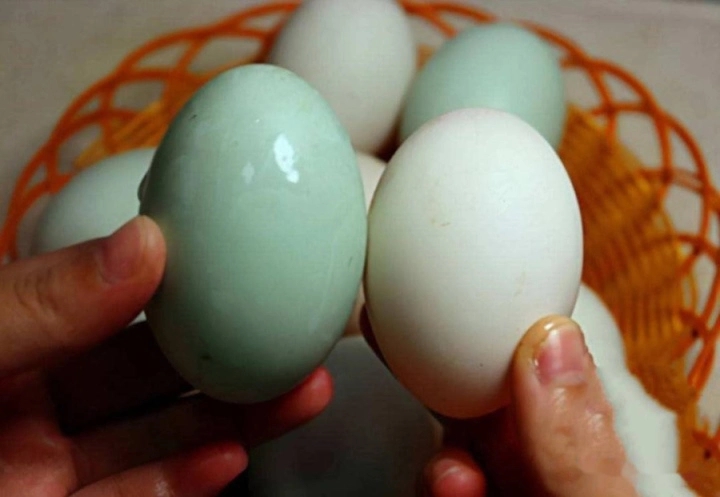In reality, different breeds of chickens, ducks, and other poultry produce eggs with different shell colors. For example, chicken eggs come in red, brown, and white, while duck eggs come in green and white shells.
The main reason for the different colors of duck eggs is primarily due to the genetics of the duck, the living environment, the farming practices, and to a small extent, the feed.
Should you choose white or green shelled duck eggs?
Whether it’s green or white shelled duck eggs, both are rich in high-quality protein, lipids, calcium, iron, and essential minerals, and both have good nutritional value. Eating duck eggs regularly is beneficial for supplementing essential nutrients for the body.
However, white shelled duck eggs and green shelled duck eggs also have some differences:

Should you choose white or green shelled duck eggs?
Eggshell thickness
– White shelled duck eggs: The shell is thinner than green shelled duck eggs. Although it may not be visible to the naked eye, you can clearly feel it by touch or by lightly weighing it against green shelled duck eggs.
– Green shelled duck eggs: The thickness of the eggshell is thicker than white shelled duck eggs. The quality of duck eggs with green-blue shells is better than those with white shells, so choosing green shelled duck eggs is not only beneficial for health but also for transportation and storage.
Nutrient content
– The protein content of green shelled duck eggs is 4.23% higher than white shelled duck eggs.
– The selenium and lysine content in green shelled eggs is slightly lower than in white shelled duck eggs.
– The acid and zinc content in green shelled eggs is also higher than in white shelled duck eggs.
Although the differences in nutrient ratios are very small, if compared, you should still choose green shelled duck eggs if you frequently eat or use them for making salted eggs. The thicker shell of green shelled duck eggs makes them less prone to breakage and easier to store.
Regarding storage
Duck eggs with green shells have thicker shells, and the appropriate storage temperature is between 2-5 degrees Celsius. They can be stored for up to 40 days. In contrast, white shelled duck eggs have relatively thinner shells, require higher storage temperatures, and have a shorter shelf life.
In general, both green and white shelled duck eggs are rich in nutrients. Depending on the purpose of use, you can choose the appropriate type of egg.
Furthermore, when buying eggs, you should pay attention to the following points to choose fresh and good-quality eggs.
When buying eggs, choose ones with clean outer shells and still fresh from the frozen aisle section. Do not buy eggs with dirt, cracks, or holes that are prone to bacterial contamination.
After purchase, quickly place the eggs in the refrigerator. Place the eggs in a carton or soft plastic container because eggs easily absorb the smell of the refrigerator. Fresh eggs can be refrigerated for about 5 weeks after packaging. If the packaging does not indicate the packaging date, you can refrigerate them for about 3 weeks from the date of purchase.

The health benefits of duck eggs
Duck eggs contain beneficial nutrients for the brain, joints, support eye protection, and enhance mental well-being.
Similar to chicken eggs, duck eggs also provide health benefits by supplying nutrients such as protein, vitamins, minerals, and good fats. Especially, the calorie content in each duck egg accounts for only 6% of the body’s daily calorie intake (about 130 calories for a 70g egg).
The cholesterol content in duck eggs is lower than in chicken eggs. If chicken eggs contain 884 milligrams of cholesterol per 100 grams, duck eggs contain 425 milligrams. This explains why people with a history of heart disease should limit their consumption of duck eggs or moderate it in their diet.
Can you eat raw duck eggs?
According to experts, raw consumption of duck eggs is limited due to the potential contamination of salmonella bacteria.
Normally, like chicken eggs, duck eggs do not have a mechanism for bacterial contamination, but duck eggs can become contaminated with salmonella bacteria through vertical transmission, meaning that if the duck’s parents are infected with salmonella bacteria, the eggs are also infected.
Currently, there is no statistics on the percentage of duck eggs contaminated with this bacteria, but most duck breeds can be infected with salmonella bacteria.
In terms of epidemiology, salmonella bacteria can affect the human digestive system, causing symptoms such as abdominal pain, diarrhea, nausea, vomiting, etc.
In European countries, people limit the consumption of raw duck eggs mainly for hatching ducks. If consuming duck eggs, they should be fully cooked to avoid bacterial contamination.
Source: vtc.vn





































